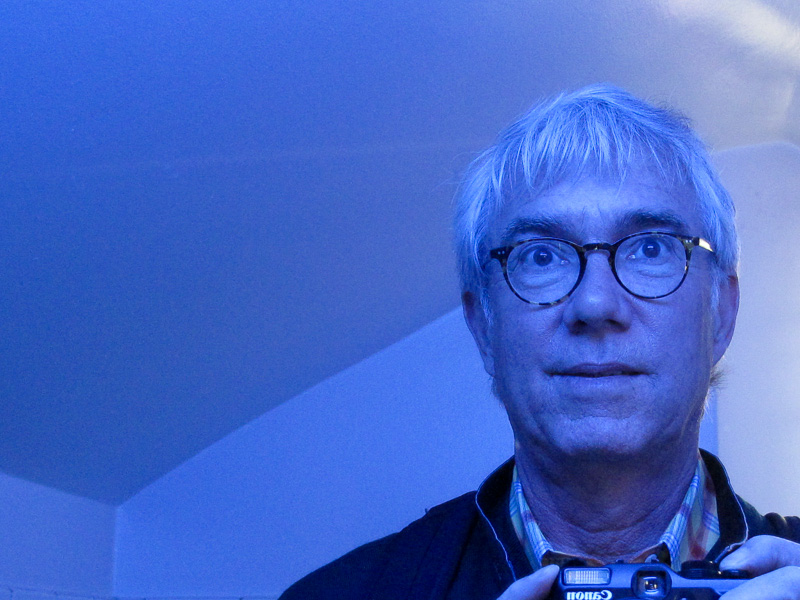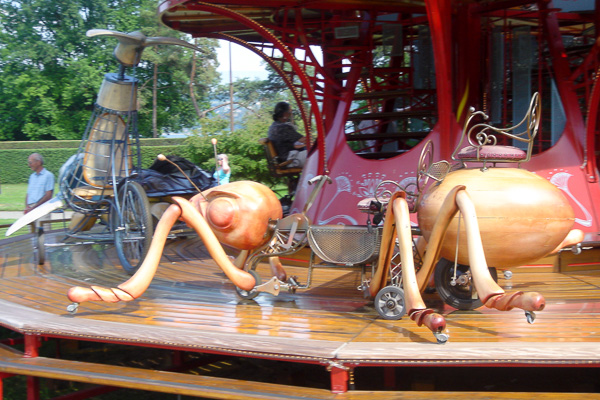I really enjoyed Cory Doctorow’s new Walkaway. I think it goes a step beyond any of his previous books. It’s up there with, say, Stross’s Accelerando, Sterling’s Holy Fire, Gibson’s Neuromancer, and my Software. In the cyberpunk pantheon.

I read Walkaway on my Kindle, and I happened to highlight passages that struck me as memorable, and the Kindle has an “Export Notes” feature, so I emailed my highlights to myself, and I’m using them for this instant blog post, adding my annotations, and the usual surrealist potpourri of more or less completely unrelated photos. I’m leaving the highlighted passages in the order in which they appeared in the book, so I’ll be dipping in and out of certain topics several times.

jesus microbes that could turn water into beer
Walkaway starts out with kids at a jokingly named “Communist party,” in an abandoned Muji factory, drinking biotech beer, fabbing free furniture from the machines that Muji happened to have abandoned there. We’re in a post-scarcity future, the three-D-printer-aficionado’s fantasy world where you can “print” or “fab” pretty much anything, even food, supplying your device with low-cost “feedstock.” And you can print out the parts to make new fabbers. Cory explored this idea in his novel Makers. But now it’s just part of the landscape. And we’ve got biotech added in. It’s all quite seamless—people used to praise Heinlein for having his future worlds feel quotidian and everyday…like, people aren’t exclaiming over the goodies, they’re just using them. And that always a thing with Gibson’s books too.

He dewormed his inboxes, flushing the junk and spum. He snooze-barred messages to bug him again later
Cory’s got good future slang here, too, with really a lot of great computer stuff. Like “spum” instead of “spam”. Why? It sounds good.

Asking the zottarich to redeem themselves by giving money away acknowledges that they deserve it all, should be in charge of deciding where it goes.
We’re in a future where, pretty much off camera, a lot of the world is kind of poisoned and trashed due to the irrational exuberance of the Pig. Cory refers to them as the “zottarich.” Meaning “zotta” like a high-number prefix along the lines of giga, tera, peta, exa. Strictly speaking the official International Systems of Units prefixes after exa are zetta, and yotta — but zotta sounds better.
Cory scores point after point against the zottarich. His characters have lots of discussions, and in many books this would kind of kill the rock of the roll, but in Walkaway it feels okay. It’s fun. The conversations are interesting. And I love the points being made. Things that are not being said in public these days.

It was like this the day after a lot of Meta, an over-emotional hangover that made her into a larger-than-life character from a soap.
His walkaway characters are young and rebellious—that classic bohemian, beatnik, hippie, punk, hipster strand of society—and at times they have fun drinking and getting high. And this creates the opportunity for new SF drugs that may or may not be stand-ins for actual drugs. Meta is a nice one, it lets you view everything with a certain irony. (I ricochet to the the Beatles line, “And though she feels as if she’s in a play, she is anyway.”)

put ten and ten together and got one hundred.
Some nice nerd humor now and then. The joke that dare not speak it’s name. The wheeze here is that they’re referring to binary numbers…

I’m groundhog daying again, aren’t I?
Who’s saying this? It’s the character Dis. Her body is dead, but before she died, they managed (thanks to Dis’s work) to copy or transfer the brain processes into the cloud, that is, into a network of computers. And she can run as a sim in there. And she’s having trouble getting her sim to stabilize. It keeps freaking out and crashing. And each time she restarts the character Iceweasel sits there talking to the computer sim, trying to mellow it out, and Dis will realize she’s been rebooted, or restarted like Bill Murray in that towering cinematic SF masterpiece Groundhog Day. And Cory has the antic wit to make that verb.
The first half of the book is kind of a standard good young people against evil corporate rich people thing. But then, when Dis is talking about groundhog dayhing, it kicks into another gear. Cory pulls out a different stop on the mighty SF Wurlitzer organ: the software immortality trope. As I’m fond of saying, in my 1980 novel Software, I became one of the very first authors to write about the by-now-familiar notion of the mind as software. That is, your mind is in some sense like software running on your physical body. If we could create a sufficiently rich and flexible computer, the computer might be able to emulate a person.
There’s been a zillion movies, TV shows, SF stories and novels using this idea since then. What I liked so much about Walkaway is that Cory finds a way to make this (still fairly fantastic and unlikely) idea seem real and new.

you and I are the only people in this place who are cognitively equipped to debullshitify their dumb-ass consensus that the thing that happens to be most convenient is also the most moral.
Now back to the one-percenter zottarich issues. Cory keeps putting his finger on the total bullshit of the power elite. Like if they want to do something it’s automatically moral.
they’d herd-mentality into some fad but pretend it was a newly discovered, ageless universal truth—not product cooked up by one of their own to sell to the rest.
And if they make up some horseshit label for something, it’s supposed to be real and important. Fake news, anyone?

Anything invented before you were eighteen was there all along. Anything invented before you’re thirty is exciting and will change the world forever. Anything invented after that is an abomination and should be banned.
Another rich thing about Walkaway is that it has characters of different ages, and they inform each other very frankly about where it’s at.

You don’t remember what life was like twenty years ago, before walkaways. You don’t understand how different things are, so you think things don’t change that much.
And it’s worth saying over and over that things were not always exactly like the present…and they won’t be at all like this in a hundred or fifty or even ten years. People are so blind! Listen to the SF writers!
convert pigopolist despoilers to post-scarcity Utopians,
Love that glib Sixties-style anti-Pig babble. Reminds me of a Black Panther paper I saw where the metaphor was maintained in extenso, with the “pig” walking on “trotters” and living in a “pen” or a “sty” and so on.

you have to be a mathematician to appreciate how full of shit economists are,
As a math major, I hated economics more than any course I took in college, in fact they almost wouldn’t let me graduate because I stopped going to econ class. And seeing this line in Walkaway, I feel vindicated at last. By the way, Walkaway has a great older woman mathematician character, the lover and then wife of Iceweasel. All kinds of people, and the full spectrum of genders, but done is such a relaxed and non-preachy way.

They have a science-y vocabulary conceived of solely to praise people like your father. Like job creator. As though we need jobs! I mean, if there’s one thing I’m sure of, it’s that I never want to have a job again … A ‘job creator’ is someone who figures out how to threaten you with starvation unless you do something you don’t want to do.
Another heavy hit against the Pig. Such a great takedown of the phrase “job creator.”

The moose regarded them for a moment. It had threadbare upholstery spots over its knees. Its shaggy fur glittered with ice crystals. Steam poured out of its nostrils in plumes that swirled in the breeze. Its jaw was ajar, making it look comically stunned, but when she looked into its huge eyes, she saw an unmistakable keenness. This moose wasn’t anyone’s fool. The moose shifted and a large turd plopped into the snow, melting and disappearing, leaving behind a steaming hole. They snickered at the unexpected earthiness. It gave them a look Limpopo read as “Oh do grow up,” though that was anthropomorphizing. It shuffled around in a broad circle, ungainly legs swinging in all directions but somehow not stepping in its own turd crater, turned its broad backside to them and walked—no, sauntered—away with a sway-hipped gait that was pure fucks-given-none.
And amid it all, there’s some really fine and closely observed nature writing. Cory understands that the physical world is beautiful and that it deeply matters.

We’d have a world that belonged to animals, and we’d experience it through sensors that perfectly simulated our wet stuff, but without crushing all those precious roots.
At some point, in the SFnal mania of it all, some of the Walkaway characters start floating the idea that it might be best if all humans uploaded themselves into the cloud as sims—and then politely removed their physical body from the physical earth.
At first when I read this passage, I misunderstood, and thought Cory was saying the sims would live in VR. But no, Rude dawg, Cory is not saying the sims will live in VR, which is the move I’ve seen in some prior tales by others, like sending the disembodied sims of to some bogus pseudo-Valhalla.
Cory gets it about Earth being where it’s at, and the sims will still “be” on earth, but “experience it through sensors that perfectly simulated our wet stuff.” Kind of voyeur relationship. Wearing a cloud condom to protect Earth. Or you can “occupy” devices like machines and e a poltergeist. Or (a move Cory doesn’t choose to make) you could grow yourself a cloned meat body like I was doing in Wetware. And of course that meat body would be “crushing those precious roots” while tromping around. Zottarich postomortem accessory?

Going off an a slight tangent, the reason it’s important not to go for a fake VR land for the sims is that, for basic physics reasons, any conventional computer-based kind of VR is likely to fall yotta short of physical reality. Why? Computers are small and shortlived. The planet is big and old. Probs because scaling. This said, it’s conceivable that a quantum computing matter-computer could make a satisfyingly funky and orgasmatronistic VR. But, uh, physical reality already is in fact a quantum computing matter-computer. So why emulate? Don’t try to fool Mother Nature…make love to her instead. That is, Cory is suggesting you become a happy ghost, slobbering over wet physical quantum computer mother Earth’s heaves and big doings. Maybe there are already ghosts doing this…who the eff knows.
(For background on these issues, see my essay, “The Great Awakening.” And for discussion, see my 2008 blog post, “Limits to Virtual Reality, 2: Answers to Comments”)
This is such a rich vein to mine, and I’m really glad Cory is opening it up a little more. Lots more goodies in there, oh my sistern and brethren.
It was lit with constellations of throwie lights, scattered in smears across the ceiling and walls, and there was a spacie-style adaptive sleep-surface, millions of sensor-embedded foam cells, like a living thing that cuddled and supported you according to an algorithm that second-guessed your circulation, writhing in a way that was disturbing and wonderful.
A wonderful closely-imagined physical SF scene.

Reality had a well-known pessimistic bias,
Great one-liner.
throw up a git to track what’s done and what needs doing
By “git” he means something like the free software sharing platform GitHub. The awareness of actual computing practices is really high in Walkaway.

Software immortality is nice, but if you can save your fleshy bodies, you should.
I agree! There’s so many issues with software immortality. What makes Walkaway so cool is that we get into some of the details of these issues. Like how does it feel to be running in a sim that you know is about to turn off, or…die?

Right at the end, as she was about to go, she let go of all the paramaterizations on her simulation, took the brakes off her emotions, lived the full spectrum of everything she could feel. Should feel. I should feel. Feeling it through her, feeling what she felt at that moment—like the best drugs you’ve ever taken times a thousand. I don’t get to have sex anymore, but this is like the best sex you’ve ever had, times a million. When I turn off my safety bumpers, it’s like I’m tearing through reality, riding a bicycle down a hill, there are trees and rocks and shit, if I hit any one of them, even brush against them, it’s over. For so long as I can steer between them, give my concentration to the problem, I’m going mach five and screaming so loud for joy it’s shattering windows. … So long as I email my diffs before I take off the brakes, it won’t be dying.”
Far out. Kind of an extreme sports death-wish fantasia here. Maybe actual physical death is this exciting? Letting go of all of our mental “bumpers”? And the last line is again a case of Cory being knowledgeable about the computeresque. Your “diffs” are the changes you made in your sim while you were running, and if someone somewhere boots up a new sim of you, then if they can merge in those diffs, the new you you be NuYu.

”Good thinking,” Iceweasel said. “Boys, you want to ride in a zeppelin?” Both boys babbled and shouted. Then Jacob got so excited he punched Stan, because reasons. They tumbled on the floor, punching and shouting.
I like the 21c grammar that Cory uses. That new usage: because [noun].
Everything was intertwingled tensegrity meshes that cross-braced themselves when stressed, combining strength and suppleness.
In one sentence we’ve got a tip of the hat to Ted Computer Lib Nelson (“Everything is deeply intertwingled) and to Bucky Fuller (“tensegrity sphere”). The idea being described here is a bicycle that only weighs a few ounces.

The network interprets censorship as damage and routes around it.
Long live the Web! So what we’ve got here is cool SF and some really harsh and relevant social commentary—highly needed in these darkening days as the pigopolists seek to steamroller our dear Amerika.









July 21st, 2017 at 6:19 am
Job creator reminds me of philanthropist, angel investor, etc. And books from like the year 1700 where one had to go on at the beginning about how the king was the most amazing perfect man in the history of men.
*places walkaway on to-read list*
July 27th, 2017 at 2:27 pm
I started the quest to read this about a month or two before the official release, then couldn’t wait until Cory’s tour to buy and begin reading. Already slightly sweaty and mildly scuffed by the time I handed it to Cory to be signed, I found it one of those books I race to finish, while at the same time dreading it’s completion, as then what? Realizing it as the chronological bridging novel between Makers and Down and Out in the Magic Kingdom (something Cory brought up during his Q&A in Vancouver in May) brings some interesting possibilities for a Makerverse extended world to continue building. Like, was Keep-A-movin’-Dan a survivor of the Akron Ohio siege? Great review, thanks Rudy!
August 15th, 2017 at 3:56 pm
To me “Walkaway” seemed like Doctorow’s attempt to distance himself from and refute the core ideas of his earlier books which glorified meritocracies and reputation systems.
As an aside, git is the name of the revision control system. Github is a commercial platform and social network based around providing git+bug tracking as a service. Another author that does actual computing practices really well is Daniel Suarez in his “Daemon” books.